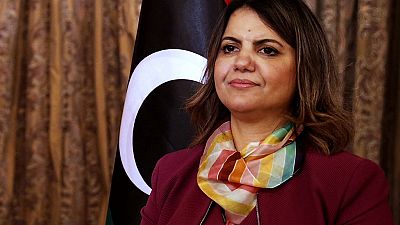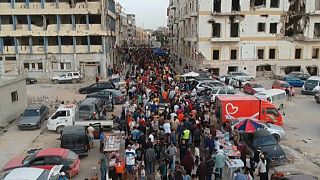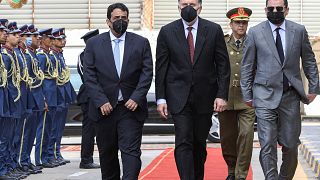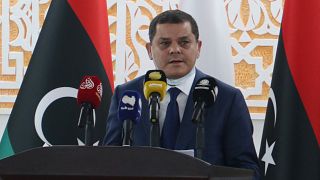Libya
Five women will hold important ministries in Libya's new government for the first time in the country's history.
While the move has been praised it is far from achieving parity in the UN-sponsored transitional government led by Abdelhamid al-Dabaiba.
Libya descended into conflict after dictator Moamer Kadhafi was toppled and killed in a NATO-backed uprising in 2011, with an array of forces battling to fill the void.
The transitional Government of National Unity (GNU), which took office this week, faces the challenge of pulling the country out of a decade of chaos and divisions, by leading it to national elections in December.
But with five women among its 26 ministers and six ministers of state, it also marks relative progress for women in politics.
This is a "major step to advance women's rights," said UN Women in Libya, while US Ambassador to Libya, Richard Norland, said it was a "historic time for Libyan women,"
The cabinet is comprised of 26 ministers and six ministers of state, with women assigned to five posts, including the key foreign affairs and justice portfolios.
Who are the ministers?
Najla al-Mangoush: An activist from Benghazi, has been appointed as head of Foreign Affairs. The trained lawyer became known in 2011 after she became part of the National Transitional Council (CNT), the official body of the 2011 revolution that ousted Colonel Muammar Gaddafi from power.
Mabrouka Touki Othman Aoki : An academic from Fezzan who holds a degree in nuclear physics, will head the Ministry of Justice.
**Halima Ibrahim Abderrahmane: **The lawyer from Gharyan will head the Ministry of Justice.
Wafaa Abou Bakr Muhammad Al-Kilani: Will lead the Ministry of Social Affairs
Houria Khalifa Miloud al-Turman**: **Will lead the Ministry of Women's Affairs
'Big step' but 'long road ahead'
Some Libyans on social media have welcomed the announcements as "a big step", a "leap for society" and a "promising start".
But activists are less enthusiastic, arguing that the new executive had the opportunity to do more.
In a statement to the UN Human Rights Council this week, Britain urged the GNU to "work towards the full, equal and meaningful participation of women, including in conflict resolution and decision-making".
"Women remain under-represented in all governance institutions and processes in Libya," it warned.
Interim Prime Minister Abdul Hamid Dbeibah, sworn in on Monday, was selected last month alongside a three-member presidency council as part of a UN-sponsored process launched in November.
Activists point to his pledge when a candidate in the UN process to allocate 30 percent of ministerial positions to women.
Under the current line-up, women account for just half that amount.
"We are proud to see Libyan women named to key posts, but also unhappy that the prime minister failed to keep his commitment," said Ghalia Sassi, president of the women's association Maaha (With Her).
She vowed activists would keep up pressure on the government to adjust its course, but said there was "a long road ahead".
'Silencing' women activists'
Although Libyan women played a key role during the 2011 uprising, they have had a limited presence in previous transitional bodies and in the current parliament.
The GNU's predecessor, the Government of National Accord, headquartered in western Libya and established in 2016, had just two women from some 30 portfolios.
A parallel eastern administration, not recognised by the international community, had just one.
And while a decade of insecurity and conflict has had a profound impact on daily life in Libya, a worrying development has been violence against rights activists, including women.
In November, unidentified armed men gunned down lawyer and women's activist Hanan al-Barassi in broad daylight in Benghazi.














02:06
Kickball: a unique fusion of football and baseball for girls in Liberia
01:03
Fuel allowance scrapped for Ghana's cabinet and public leaders
Go to video
Greece cracks down on irregular migration, says it’s "not an open corridor to Europe"
01:18
SA athlete Semenya did not receive fair trial, ECHR rules
01:49
Broken windows and lootings: Nairobi businesses deal with protest aftermath
01:30
Nigerian singer Tems launches Leading Vibe Initiative to support women in music